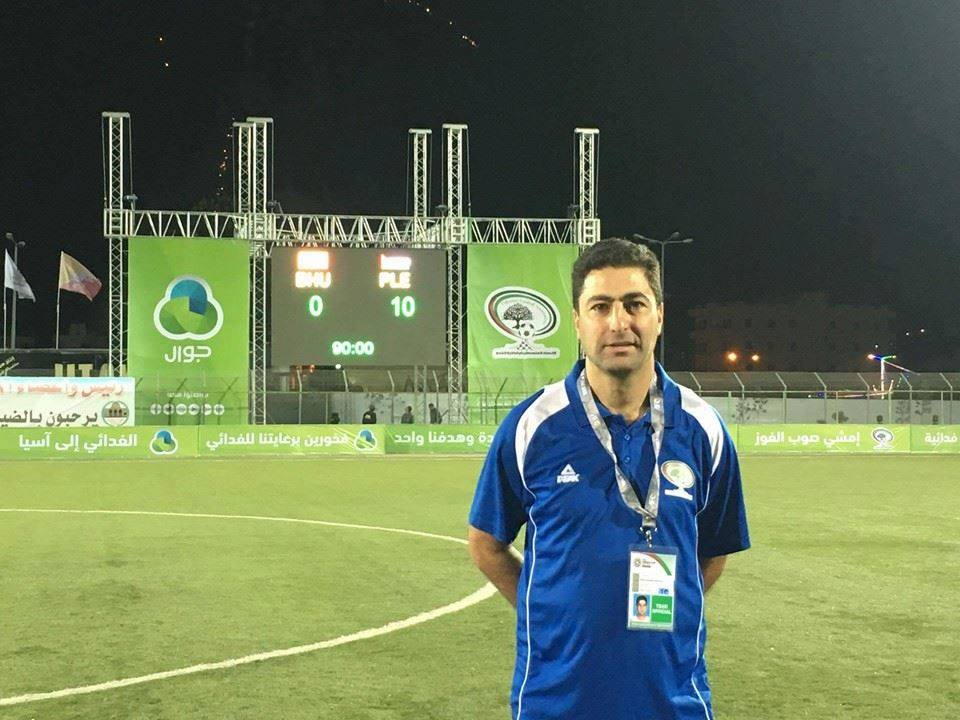 |
| Palestine Manager Abdel Nasser Barakat |
At this precise moment, the football world is a little too preoccupied to give Palestine and its fantastic manager- Abdel Nasser Barakat- their due credit.
For those who haven’t realized, perennial World Cup finalists Ghana, Chile, Netherlands, and USA have been dumped out of 2018 World Cup qualifying. Panama is going to its first tournament, as are tiny Iceland. Old faces from a bygone era such as Egypt are also back at the big dance.
Closer to home, the world has been captivated by the incredible run of Syria’s national football team whose grit and determination left them centimeters away from knocking out Australia and advancing to another playoff.
If you have forgotten, Palestine play in Asia- the weakest confederation of them all- where garnering global, and at times, regional headlines for something other than a CSL transfer record is nearly impossible.
That said, no one affiliated with Palestinian football should wait on the plaudits of the global community to recognize good work. This is the best moment in national team history and the numbers are there to prove it.
Palestine became the first nation to seal qualification for the 2019 AFC Asian Cup through the direct qualifiers with a 10-0 against Bhutan. This is an achievement that is too easily dismissed due to the nature of their opponents but the fact remains that more seasoned rivals are lagging behind Al-Fida’i.
Jordan (who were the last team to be eliminated from the 2014 World Cup Finals) have yet to qualify- dropping points against the likes of Vietnam and Afghanistan. Korea DPR (2010 FIFA World Cup Finalists) are struggling and Bahrain (2004 Asian Cup semifinalists and near World Cup Finalists in 2006 and 2010) just lost to Chinese Taipei.
The aforementioned nations are ones that expect to be at the Asian Cup and Palestine has outperformed them by every conceivable metric. The man behind that triumph is the manager who inherited an unenviable situation in 2015 and has delivered more than what was asked of him
Mending the ‘fence
What everyone will remember from that brief appearance at the 2015 AFC Asian Cup finals is how bad the team was defensively. Palestine was utterly shambolic, and after conceding 11 goals in three games, the confidence was all but gone.
By the fourth game of Barakat’s reign the team had three clean sheets to its name. He made some very tough calls following the Asian Cup. Excluding Ramzi Saleh in favor of Toufic Ali and then transitioning to Rami Hamadi when the time called for it.
Barakat forged a new midfield around lynchpin Mohammed Darwish that masked Palestine’s fragility in the back. Alongside Darwish, the former Al-Bireh winger handed caps to Pablo Tamburrini, Mohammed Yameen, Shadi Shaban and phased out the needless over reliance on Khader Yousef. The trio were amongst 20 players who debuted under Abdel Nasser Barakat.
When the former Olympic Team manager needed to lean on veterans he did not hesitate to bring them back in the fold- Ahmad Mahajneh and Tamer Salah rehabilitated their tattered reputations in the immediate aftermath of Ausralia 2015.
Following some back and forth with senior players, he brought back Abdelatif Bahdari- restored him as captain- and has extended a career that seemed close to the end.
He identified the need for depth at full-back and worked with Musab Al-Battat to refine his defensive abilities. Left back, a constant source of trouble might have been solved when Jamal Mahmoud brought Abdallah Jaber to the national side, but a more than capable deputy in Fadi Salbees was incorporated by Barakat.
After 18 matches at the helm- Barakat’s side has conceded a paltry 12 goals. A quarter of that total came in his first game against Saudi Arabia, five came in friendlies, and only four came in a competitive match- with only one goal being scored during the run of play.
Changing of the Guard
The biggest change in the team is the laser focus of every single man part of the squad. I have spoken to dozens of players involved in the set up and even the ones upset with their playing time are focussed on the goal. There might be objections here and there (completely normal) but the players approve of Barakat and the work he is doing.
What started as a string of bland draws has come to fruition in 2017 and culminated with a successful qualifying campaign.
In attack, Barakat has chopped and changed; and while he might not have found the exact mix of players, he has plenty of competent players to choose from. Sameh Maraaba and Tamer Seyam have stepped up to replace former domestic stalwarts Ismail Amour and Husam Abu Saleh.
In the face of a lot of pressure, he made the right call to move away from Ashraf Nu’man, handing the creative duties to Jonathan Cantillana who has been consistent and quietly dominant in his time with the national team.
When he has turned to alternate options off the bench, he has been repaid in kind. He brought on Ahmad Abu Nahyeh against Timor Leste, converted Jaka Ihbeisheh to a right back against Malaysia, and threw on Ahmad Maher at a pivotal juncture of the game in Malé.
In attack, Barakat continues to tinker but seems to have found at least one of the pieces of the puzzle in Yashir Pinto. The Santiago born forward’s versatility has resulted in him scoring five very different goals with national team in just 8 appearances. He’s scored a tap in vs. Timor Leste to open his account on his debut and then followed that up by latching on to a long ball in the same game. He scored with a late run into the box vs. Yemen, from outside the box vs. Oman, and created a goal out of nothing against Bhutan.
There are now 13 months for the tactician to put his final touches on the team. He will have some interesting pieces to work with in the shape of Swedish based trio Ahmad Awad, Mahmoud Eid, and Hosam Aiesh.
If Palestine can find added fluency in their attack, the team could be on the verge of something truly special.
The Numbers
There are not many more records for Barakat left to break. His current Goals per Game ratio stands at 2.61- higher than the 2.50 mark set by Saeb Jendeya in two matches as an interim coach in October 2014. Barakat’s teams have given up less than a goal a game (.67) and no team has a better defensive record in Asian Cup qualifying
Since June 2015, Palestine have averaged 1.89 points per game- extrapolate that over a 38 game season and the side would be on course for 71 points.
The former Olympic Team manager has won half of the games he has taken charge of en route to a 9-2-7 record. Seven of the nine wins have been in competitive fixtures.
With 47 total goals to the manager’s name he can equal Jamal Mahmoud’s output (51 in 35 games) if Palestine put four past Maldives next month.
Then there is the matter of the fantastic run Palestine is currently on. Palestine have not lost since that fateful Ben Williams game in Abu Dhabi. They have won all five competitive fixtures since then and and are undefeated in 10 games with six straight wins.
Those six straight wins are an achievement that Asian Champions Australia have not managed since joining the AFC (their record is five).
Show him the money!
We will never know what might have been for Palestine had they not decided to force Jamal Mahmoud out back in 2014. Since leaving the national team, however, Mahmoud has only gone from strength to strength. He led Ahli Amman to the only silverware in their history and despite their limited budget they were a very capable side in the 2017 AFC Cup.
He has since parlayed that into a return to his hometown club- Al-Wehdat where he has revitalized a moribund club in a matter of months.
Often times, organizations do not get a chance to recover from such disastrous mistakes. After crashing out of the Asian Cup it looked like we might never return.
For those that doubt that statement, cast your minds back to the national team between 2007-14. How many marquee matchups do you remember? What was the signature win of that era? Outside of the Challenge Cup triumph, there is not one qualifier that stands out. We as a footballing public were looking down that barrel in 2015.
Barakat has changed all that. He has taken this team to the next level and deserves a chance to continue on to the 2019 AFC Asian Cup finals and beyond.
Its time he gets rewarded for his accomplishments.




